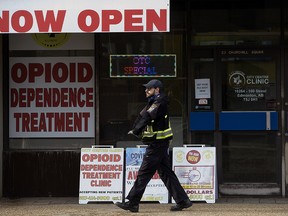Author of the article: Anna Junker
Publishing date: Apr 10, 2022 •

A pedestrian walks past advertisements for opioid dependence treatment outside the City Centre Clinic,10264 100 St., in Edmonton on Feb. 7, 2022.
PHOTO BY DAVID BLOOM /Postmedia
Edmonton city council will debate the next steps on decriminalization of personal possession of drugs on Monday.
Council will hear an information report city administration put together on what it would take to pursue an exemption under the federal Controlled Drugs and Substances Act as one step to addressing the increasing drug poisoning crisis in the city.
Coun. Michael Janz, who asked for the report, said he’s heard widespread support for action and next steps from his council colleagues.
“We realize that decriminalization is one step that we can take to remove the stigma and help people move towards treatment and it helps us move towards a public health model rather than a carceral model,” Janz said.
“We know decriminalization is but one measure, there’s multiple measures that need to be taken. Safe supply, permanent supportive housing, harm reduction, drug testing, all of these, we need to try anything we can.”
Edmonton would be the latest jurisdiction in Canada to pursue decriminalization if council decides to move forward.
In January, Toronto Public Health, which sets the public health policy for the municipality of Toronto, submitted a request to Health Canada for an exemption to allow for personal possession of drugs. The City of Vancouver, with support of the Vancouver Coastal Health Authority, and British Columbia have also submitted exemption requests.
Montreal, Ottawa, and Winnipeg are also exploring the possibility of requesting an exemption.
The report notes that if council were to pursue an application for exemption, the preparation of evidence would be a “significant undertaking” that could require “substantial staff time, specialized external expertise and community outreach with ongoing communication and monitoring requirements should any exemption be approved.”
Janz said it is critical the city moves ahead with a broad coalition of community members, including researchers, public health experts, people with lived experience, people who use drugs, and centre a public health model.
“We need to treat this for what it is, a crisis resulting in inadequate action on poverty, mental health and trauma,” he said.
“This is not a criminality problem, but absent safe supply, and absent harm reduction, we see these impacts on our criminal justice system.”
Last year, 1,771 Albertans, including 674 Edmontonians, died of a drug poisoning.
“We need to have a much more empathetic, compassionate, frank conversation and that’s why this has to be a public health issue,” said Janz.
ajunker@postmedia.com
Edmonton city council will debate the next steps on decriminalization of personal possession of drugs on Monday.
Council will hear an information report city administration put together on what it would take to pursue an exemption under the federal Controlled Drugs and Substances Act as one step to addressing the increasing drug poisoning crisis in the city.
Coun. Michael Janz, who asked for the report, said he’s heard widespread support for action and next steps from his council colleagues.
“We realize that decriminalization is one step that we can take to remove the stigma and help people move towards treatment and it helps us move towards a public health model rather than a carceral model,” Janz said.
“We know decriminalization is but one measure, there’s multiple measures that need to be taken. Safe supply, permanent supportive housing, harm reduction, drug testing, all of these, we need to try anything we can.”
Edmonton would be the latest jurisdiction in Canada to pursue decriminalization if council decides to move forward.
In January, Toronto Public Health, which sets the public health policy for the municipality of Toronto, submitted a request to Health Canada for an exemption to allow for personal possession of drugs. The City of Vancouver, with support of the Vancouver Coastal Health Authority, and British Columbia have also submitted exemption requests.
Montreal, Ottawa, and Winnipeg are also exploring the possibility of requesting an exemption.
The report notes that if council were to pursue an application for exemption, the preparation of evidence would be a “significant undertaking” that could require “substantial staff time, specialized external expertise and community outreach with ongoing communication and monitoring requirements should any exemption be approved.”
Janz said it is critical the city moves ahead with a broad coalition of community members, including researchers, public health experts, people with lived experience, people who use drugs, and centre a public health model.
“We need to treat this for what it is, a crisis resulting in inadequate action on poverty, mental health and trauma,” he said.
“This is not a criminality problem, but absent safe supply, and absent harm reduction, we see these impacts on our criminal justice system.”
Last year, 1,771 Albertans, including 674 Edmontonians, died of a drug poisoning.
“We need to have a much more empathetic, compassionate, frank conversation and that’s why this has to be a public health issue,” said Janz.
ajunker@postmedia.com
No comments:
Post a Comment